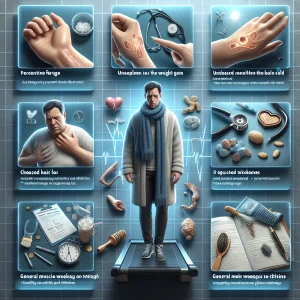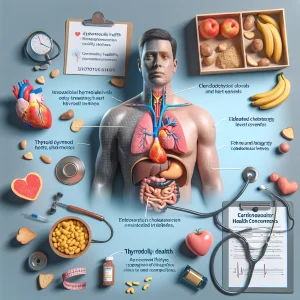Understanding the Critical Health Risks and Implications of Hypothyroidism in Men
Hypothyroidism in men represents a significant health concern arising from the thyroid gland’s failure to adequately produce essential hormones, primarily thyroxine (T4) and triiodothyronine (T3). These hormones are crucial for regulating various bodily functions, including metabolism, sustaining energy levels, and supporting overall vitality. While hypothyroidism can affect anyone, men often face unique symptoms and challenges that can drastically impact their quality of life. Therefore, a comprehensive understanding of this condition is vital for effective treatment and successful management.
Identifying the specific characteristics of hypothyroidism is essential for implementing effective treatment and management strategies. Men often overlook the signs of this condition, attributing symptoms to stress, lifestyle changes, or natural aging. Such misconceptions can lead to prolonged discomfort, further health complications, and a marked decline in overall well-being if left unaddressed. Thus, timely detection is imperative for achieving optimal health outcomes and preserving a fulfilling quality of life.
The causes of hypothyroidism are multifaceted, including autoimmune disorders such as Hashimoto’s thyroiditis, medication side effects, or complications from radiation therapy. Recognizing symptoms early is critical for timely intervention, potentially leading to improved health and a significantly enhanced quality of life.
Essential Facts About Hypothyroidism That Every Man Should Be Aware Of
- Hypothyroidism in men signifies insufficient production of thyroid hormones by the gland, resulting in a range of physical and psychological health challenges.
- Physical symptoms may include persistent fatigue, unexpected weight gain, thinning hair, and muscle weakness. Men also face increased health risks, such as high cholesterol, a higher likelihood of heart disease, and potential onset of diabetes.
- The emotional and psychological impacts of hypothyroidism can lead to depression, anxiety, and cognitive difficulties, significantly detracting from overall quality of life.
- This condition can adversely affect sexual health, leading to decreased libido, erectile dysfunction, and potential fertility challenges.
- Men with hypothyroidism frequently encounter difficulties with weight management, as the condition reduces metabolic rates, complicating weight loss efforts and necessitating tailored dietary and exercise plans.
 Identifying the Physical Symptoms and Health Risks Associated with Hypothyroidism
Identifying the Physical Symptoms and Health Risks Associated with Hypothyroidism
The physical manifestations of hypothyroidism can differ significantly among men. Common complaints include ongoing fatigue, unexplained weight gain, an increased sensitivity to cold, and pronounced muscle weakness. You may find yourself feeling drained even after a full night’s sleep or struggling to lose weight despite adhering to a healthy diet and maintaining a regular exercise routine.
Such distressing symptoms can lead to self-doubt about your health choices and fitness practices. Additionally, hypothyroidism may present itself in subtler forms, such as changes in skin texture—evident through dryness or pallor—and increased hair loss or thinning. Prompt intervention regarding these symptoms is essential for effective management and improved health outcomes.
A slowed heart rate may also develop, contributing to feelings of lethargy and reduced stamina during physical activities. The cumulative effect of these physical symptoms can greatly disrupt daily life and overall functionality. Therefore, if you suspect that hypothyroidism is impacting your health, seeking medical advice is critical.
Examining the Mental and Emotional Struggles Associated with Hypothyroidism
The mental and emotional repercussions of hypothyroidism often go unnoticed yet deserve significant attention. When thyroid hormone levels decline, you may experience mood fluctuations, increased feelings of depression, or heightened anxiety. These emotional changes can lead to irritability and fatigue, straining personal relationships and diminishing overall life satisfaction.
Research highlights the intricate relationship between thyroid function and mental health, underscoring the need to recognize this connection for effective management. Cognitive abilities may also decline due to hypothyroidism, resulting in experiences often referred to as “brain fog.” You might find it challenging to concentrate, forget simple tasks, or feel mentally sluggish, especially in fast-paced environments where mental clarity is vital.
Identifying these cognitive and emotional symptoms as significant aspects of hypothyroidism is crucial for advocating appropriate medical interventions. For further insights on the connection between hypothyroidism and mental health, explore resources available at the Mayo Clinic.
 Understanding the Significant Impact of Hypothyroidism on Men's Sexual Health
Understanding the Significant Impact of Hypothyroidism on Men's Sexual Health
Hypothyroidism can profoundly influence sexual health in men, leading to several complications. Reduced thyroid hormone levels may result in diminished libido, erectile dysfunction, and even infertility. You may experience a noticeable decline in your interest in sexual activity or face challenges achieving or maintaining an erection.
These sexual health issues can be distressing, often triggering feelings of inadequacy, frustration, or anxiety within intimate relationships. The hormonal imbalances caused by hypothyroidism can also interfere with testosterone levels, complicating the intricate dynamics of sexual health. Low testosterone can lead to heightened fatigue, mood swings, and reduced sexual desire, creating a challenging cycle that can be difficult to break.
It’s important to communicate openly with your healthcare provider regarding these sexual health concerns to explore effective treatment options that aim to restore both thyroid function and sexual well-being, ensuring a holistic approach to your health.
Effective Strategies for Weight Management in the Context of Hypothyroidism
Weight management can pose particular challenges for men diagnosed with hypothyroidism. The metabolic slowdown associated with low thyroid hormone levels can hinder your weight loss or maintenance efforts. Despite consistent exercise and a balanced diet, you may find that shedding excess pounds feels like an insurmountable challenge.
This ongoing struggle can lead to feelings of frustration and hopelessness regarding your weight loss journey. Understanding the correlation between hypothyroidism and weight gain is essential in developing effective strategies. Collaborating with a healthcare provider can help create a customized plan addressing both thyroid health and weight management goals.
This collaborative approach may encompass medication adjustments, dietary modifications, and specific exercise routines designed to enhance metabolism while accommodating your energy levels. By working together, you can find a balanced approach to managing your weight effectively.
 Examining the Link Between Hypothyroidism and Cardiovascular Health Risks
Examining the Link Between Hypothyroidism and Cardiovascular Health Risks
The link between hypothyroidism and cardiovascular health is a critical concern for men diagnosed with this condition. Inadequate levels of thyroid hormones can lead to elevated cholesterol levels, which increase the risk of heart disease over time. It’s crucial to recognize that the fatigue and lethargy frequently associated with hypothyroidism may not only indicate the condition itself but may also signal underlying cardiovascular issues requiring attention.
Regular cardiovascular health assessments are essential for individuals with hypothyroidism. Your healthcare provider may recommend lifestyle modifications, including a heart-healthy diet rich in fruits, vegetables, whole grains, and lean proteins. Additionally, engaging in consistent physical activity that aligns with your energy levels can support thyroid function and enhance cardiovascular health. By proactively managing both thyroid health and cardiovascular fitness, you can significantly reduce the risk of further complications.
Understanding How Hypothyroidism Affects Male Fertility
Fertility challenges are another critical aspect associated with hypothyroidism in men. Low levels of thyroid hormones can disrupt the delicate hormonal balance crucial for sperm production and overall reproductive health. If you are encountering difficulties conceiving, it’s important to consider how your thyroid function may be influencing your fertility journey.
Effectively managing hypothyroidism through appropriate treatment can enhance overall health outcomes and increase the chances of successful conception. Partnering with a knowledgeable healthcare provider who understands the complex interplay between thyroid function and fertility is essential for developing a comprehensive approach that addresses both aspects. This strategy may involve regular monitoring of hormone levels through blood tests and adjusting medications to optimize reproductive health.
Comprehensive Approaches for Managing and Treating Hypothyroidism in Men
Successfully managing hypothyroidism necessitates a holistic approach that incorporates regular monitoring through blood tests, diligent medication management, lifestyle adjustments, and transparent communication with healthcare professionals. Blood tests are fundamental for diagnosing hypothyroidism, assessing key markers such as Thyroid-Stimulating Hormone (TSH) and T4 levels. Elevated TSH levels typically indicate an underactive thyroid, while low T4 levels confirm the diagnosis.
Upon diagnosis, treatment typically involves hormone replacement therapy using synthetic thyroid hormones, such as levothyroxine. This medication helps restore normal hormone levels, alleviating many symptoms associated with hypothyroidism. Regular follow-up appointments are crucial for assessing treatment effectiveness and making necessary adjustments based on blood test results.
In conjunction with medication, lifestyle changes—such as following a nutrient-dense diet that supports thyroid health with sufficient iodine, selenium, and zinc—can be beneficial. Incorporating regular exercise appropriate to your energy levels can also aid in managing symptoms while enhancing overall well-being. By actively participating in your health management through education, collaboration with healthcare providers, and lifestyle changes, you can lead a fulfilling life despite the challenges posed by hypothyroidism.
Frequently Asked Questions About Hypothyroidism in Men
What is hypothyroidism in men?
Hypothyroidism in men refers to a condition where the thyroid gland fails to produce enough thyroid hormones, leading to a metabolic slowdown and various health complications.
What symptoms are commonly experienced by men with hypothyroidism?
Common symptoms of hypothyroidism in men include persistent fatigue, weight gain, cold sensitivity, dry skin, constipation, muscle weakness, and feelings of depression.
How is hypothyroidism diagnosed in men?
The diagnosis of hypothyroidism in men is established through blood tests that measure levels of thyroid-stimulating hormone (TSH) and thyroxine (T4) in the bloodstream.
What factors contribute to the development of hypothyroidism in men?
The primary cause of hypothyroidism in men is often an autoimmune disorder known as Hashimoto’s thyroiditis. Other factors may include thyroid surgery, radiation treatment, and certain medications.
What treatment options are available for men diagnosed with hypothyroidism?
Men suffering from hypothyroidism typically receive treatment through synthetic thyroid hormone medications, such as levothyroxine, to replenish deficient hormones and restore normal thyroid function.
Can hypothyroidism lead to additional health complications in men?
If left untreated, hypothyroidism in men can result in complications such as heart disease, fertility challenges, and mental health issues. Seeking appropriate treatment is crucial to minimize these risks.
This Content Is Sponsored By: Thyroid Testing UK
Hypothyroidism in Men: The Impact On Health Was First Published By https://bloodtest.co.uk
Find Us On Facebook: EZ Blood Tests
The Article: Hypothyroidism in Men: Health Implications Explored appeared first on: https://ezbloodtest.com
The Article Hypothyroidism in Men: Exploring Health Implications Was Found On https://limitsofstrategy.com
The Article Hypothyroidism in Men: Health Implications Uncovered First Appeared ON
: https://ad4sc.com
Comments are closed